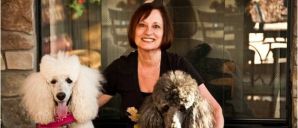We asked the University of Nevada, Reno's Dr. Diane Barone - foundation professor of literacy studies at the University of Nevada, Reno's College of Education - for her thoughts on education, and here's what she had to say.
What was it about education that made you interested in pursuing it as a profession?
I guess it started when I played school with all of my cousins. Naturally, I had to be the teacher. I entered college and majored in psychology with a minor in education and I loved working in urban schools. I spent two days a week helping teachers. Then I was able to work in a preschool that was part of a hospital as a summer internship. That hooked me. I loved working with the kids. From these experiences, I completed a master's in early childhood literacy. Right after I completed this degree I moved to Reno and became a first grade teacher. After a few years, I became the demonstration teacher for the district where I taught first, second, and third grade students together. I loved it and I began working with professors on research. I decided to obtain my doctorate in education and now I get to work with teachers and soon-to-be teachers. I also conduct research in classrooms so I am still in touch with students.
With increasing federal incentives for improved science and technology scores, how have you seen curriculum development change over the last few years?
I am a professor of literacy. The biggest changes in my area are from the Common Core State Standards. Within the standards is an expectation that students will have multimodal experiences. So in my children's literature class students move from print materials to electronic materials. We have brought iPads into all of our literacy classes. In our tutoring class, our students work with elementary students to create a digital story. We also have included more focus on nonfiction within all of our classes.
Given the sizable financial investment for college, what is your approach in guiding students to pursuing a degree in education?
What a question. I think that providing a quality education for Pre-K to 12th grade students is critical to the success of the United States. There is no profession that does not hinge on quality Pre-K - 12 education. So the most important profession is that of being a teacher.
What's one thing that keeps you excited to come into work every day in the field of education?
I love learning from teachers and students. All of my research is guided by teachers' questions. I share what I learn with my university students so that they can see issues that they will address as teachers or already pondering for practicing teachers. I love working with university students, no matter what level. I enjoy getting them excited about teaching or to renew a love for teaching.
What kind of collective effort do you think is needed to ensure that students perform well not just on tests but take valuable, applicable knowledge for their lives and future careers?
I think we all need to support students through high-level work that enriches their thinking. I think that when you ask students to engage in low-level tasks they comply and see learning as a routine. I want students to be excited and to be willing to deal with ambiguity as they problem solve solutions. For example, I want teachers to ask students questions they do not already have the answers to.
For a student pursuing a degree in education today, what advice would you give them for getting their degree and the time afterward?
I would suggest that they move from viewing themselves as students where they just complete tasks in each class as assigned. I want them to think as teachers as they complete learning expectations. They might question, why is the instructor having me learn about beginning literacy? How might I use this information if I am planning on being a fifth grade teacher? This thinking will help them shift into the role of teacher and this type of thinking will guide them in the experiences they provide to their students.
